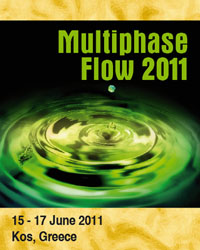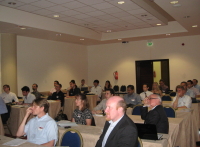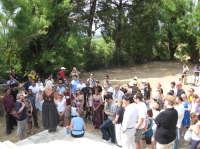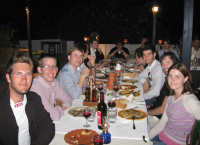Multiphase Flow 2011
6th International Conference on Computational and Experimental Methods in Multiphase and Complex Flow
15 - 17 June 2011
Kos, Greece
Overview
 The sixth International Conference on Computational and Experimental Methods in Multiphase and Complex Flow took place on the Greek Island of Kos chaired by Professor Andrea Mammoli of the University of New Mexico and Professor Carlos A Brebbia of the Wessex Institute of Technology (WIT).
The sixth International Conference on Computational and Experimental Methods in Multiphase and Complex Flow took place on the Greek Island of Kos chaired by Professor Andrea Mammoli of the University of New Mexico and Professor Carlos A Brebbia of the Wessex Institute of Technology (WIT).
The study of multiphase flow is ever increasing in scope, primarily because of the increasing importance that these flows have in manufacturing, mineral extraction, environmental remediation, and medicine to name a few, and because of the technological advances that are constantly occurring. Despite experimental, theoretical and computational efforts that have spanned decades, we are still far from a full understanding of the complex behaviours inherent in multiphase flows. There are several causes of the difficulty in formulating accurate models even for the simplest of systems. The introduction of phenomena occurring at several different length scales, which in general can not be decoupled from each other, is the primary difficulty. At the smallest – nano – scales, processes occur which are neither continuum nor molecular, and therefore can not be treated either at the molecular level – the problem being too big – or at the continuum level – the model may miss important non-continuum effects. Examples of such situations are interface phenomena at engineered interfaces, which involve both a vapour and a liquid phase, or surface-to-surface interaction via an intervening fluid. One length scale up – micro – structure formation can cause difficulties in formulating boundary conditions and constitutive equations. Most investigations have approached the problem by applying direct numerical simulation at some level, and using models as approximations to treat smaller-scale phenomena, with the ultimate aim of finding out enough about the flow behaviour to be able to construct a constitutive model which captures the essential physics.
Presently, a theory that views all aspects, is not considered a viable proposition, because of the many possible combinations of flow parameters. Therefore, it is still necessary to categorize multiphase flow problems into various categories (e.g. bubble flows, fluidized beds, suppression, etc.). Within each of these categories, it is possible to develop accurate descriptions of the flows.
The overall focus of this conference series is the combination of experimental and computational techniques to gain a better understanding of individual classes of multiphase flow. The goal of the meeting was to facilitate the exchange of ideas and experiences directly and interactively, thereby promoting the development of knowledge in this increasingly important topic.
Previous meetings were held in Orlando, Florida (2001); Santa Fe, New Mexico (2003); Portland, Maine (2005); Bologna (2007) and the New Forest, UK (2009).
Opening Addresses
 Professor Carlos A Brebbia opened the meeting by welcoming the delegates in the name of the Wessex Institute of Technology. He explained the work of WIT and the importance of the conference programme to achieve one of its main objectives, the dissemination of knowledge and in particular scientific and technical information.
Professor Carlos A Brebbia opened the meeting by welcoming the delegates in the name of the Wessex Institute of Technology. He explained the work of WIT and the importance of the conference programme to achieve one of its main objectives, the dissemination of knowledge and in particular scientific and technical information.
WIT has a wide range of other activities, including industrial consulting, and publications. The Transactions of the Wessex Institute, for instance, contains nearly 25,000 papers presented at the Institute’s conferences since 1993, the great majority of them are as offered as Open Access. This and the distribution of conference books give the widest dissemination to the work presented at WIT meetings.
WIT – Professor Brebbia explained – welcomes interaction with other institutions, including research, training and advanced technology. The training of the Institute is at PhD and Masters level, frequently in collaboration with other institutes.
The research carried out at the Institute on computational methods, particularly Boundary Elements, has found important applications in engineering practice. Currently this research is focused on corrosion prevention systems and fracture mechanics analysis, problems which are difficult to solve using other techniques.
Professor Brebbia ended by pointing out that the Institute is focused on advanced analysis and the development of better computational tools, stressing quality rather than quantity. This led also to the continuous improvement of the physical installation in its New Forest campus, to provide an environment better conducive to research and original work. This is the motivation behind the new residential facilities and the shortly to be built gym and covered swimming pool building which has been designed with special consideration to energy saving.
Professor Andrea Mammoli explained the work at the University of New Mexico and in particular the research related to the conference. They have a number of activities related to Multiphase Flow, including the study of porous media using BEM, interface phenomena, slash-driven phenomena, mixing in ‘lab-on-a-chip’ techniques and transport phenomena in fuel cells.
Professor Mammoli explained that the collaboration of the New Mexico group with WIT thirty or so years ago in the field of Boundary Elements and covered a wide range of applications, including more recently new renewable resources.
The collaboration between the School of Engineering at the University of New Mexico and WIT continues to this day, not only through the holding of the Multiphase Flow conference, but also regarding sustainable energy studies.
Invited Presentations
The programme included as series of invited presentations;
‘Heat and mass transfer in evaporating turbulent drop-laden flow’
by Rodion Groll, University of Bremen, Germany
‘Analogues of Rayleigh-Taylor and Richtmyer-Meshkov instabilities in flows with nonuniform particle and droplet seeding’
by Peter Vorobieff, University of New Mexico, USA
‘Hydrodynamics behaviour of slot-rectangular spouted beds: assessment of slot width effect’
by Nader Mahinpey, University of Calgary, Canada
‘Air-water of a two phase flow behaviour air-water in a horizontal pipe using computational fluids dynamics (CFD)’
by Miguel Asuaje, Simon Bolivar University, Venezuela
Conference Topics
The papers were divided into the following topics;
- Multiphase flow simulation
- Turbulent flow
- Bubble and drop dynamics
- Heat transfer
- Incline flow
- Emerging applications
- Flow in porous media
Social Occasions and Excursions
The conference presented many interesting opportunities for interaction between the delegates, not only in the formal sessions but through a series of social occasions, including the lunches organised by WIT, a welcoming cocktail, the conference dinner and a very popular excursion at the end of the conference (which is described in detail below).  A special excursion was organised at the end of the conference which included a guided tour of the Asklepicion, the most famous and important archaeological site on the island. It was the centre of Hippocrates Medical School, in which he practiced medicine. The remains of the old sanatorium demonstrate the importance of site, with its extensive gardens for the patients, affluent temples and baths. It is in a beautiful and peaceful location. From there the group proceeded to visit the most important vineyards of the island where excellent wines are produced. The delegates were able to taste some outstanding Sauvignons and Cabernets in addition to others prepared with Greek grapes. Following that the bus took the group to St. Stefanios where they went by boat to a small, secluded beach. There the delegates were offered a barbeque and have the possibility of swimming in the sea. The excursion gave them the opportunity of further interaction in the right environment and offered another view of the beautiful island of Kos.
A special excursion was organised at the end of the conference which included a guided tour of the Asklepicion, the most famous and important archaeological site on the island. It was the centre of Hippocrates Medical School, in which he practiced medicine. The remains of the old sanatorium demonstrate the importance of site, with its extensive gardens for the patients, affluent temples and baths. It is in a beautiful and peaceful location. From there the group proceeded to visit the most important vineyards of the island where excellent wines are produced. The delegates were able to taste some outstanding Sauvignons and Cabernets in addition to others prepared with Greek grapes. Following that the bus took the group to St. Stefanios where they went by boat to a small, secluded beach. There the delegates were offered a barbeque and have the possibility of swimming in the sea. The excursion gave them the opportunity of further interaction in the right environment and offered another view of the beautiful island of Kos.
International Scientific Advisory Committee
The International Scientific Advisory Committee met to discuss the conference, aiming to improve it when it reconvenes in 2013. Several new topics were proposed and a few new names to be invited to the committee, as well as possible locations. Their advice will be passed to the Conference Division of WIT which will search for suitable venues.
Conference Dinner

The conference dinner took place in one of the best restaurants on the island, in the picturesque village of Zia, high in the mountains. The restaurant is famous for its baked meats, has a unique location, the right one for watching a spectacular sunset. The meal consisted of local specialities of the island, accompanied by excellent wines. The main course was locally produced lamb, very tender and lean after having been cooked overnight in the oven. At the end of the dinner, Professor Brebbia thanked the delegates for coming and offered them a small present to mark the occasion.
The conference was characterized by its friendliness and the high degree of interaction amongst the delegates. The meeting will be reconvened in 2013 in a location and at a date to be decided shortly.
Publication of Papers
The proceedings of Computational Methods in Multiphase Flow VI, 344pp (Print ISBN: 978-1-84564-518-2; Online ISSN: 1746-4471) are available in paper and digital format from WIT Press priced at £148/US$298/€207. Orders can be placed on the WIT Press web site at www.witpress.com or by email:
Papers from the conference will also be hosted online at the WIT eLibrary as Volume 70 of WIT Transactions on Engineering Sciences (Online ISSN: 1746-4471). For more details visit the WIT eLibrary at http://library.witpress.com


 Wessex Institute
Wessex Institute